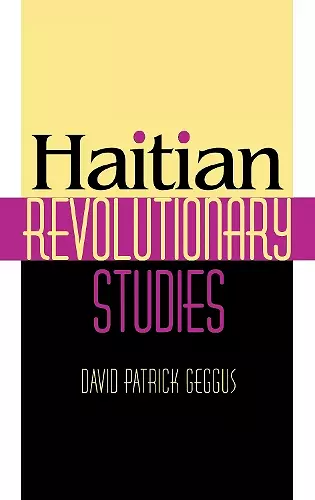Haitian Revolutionary Studies
Format:Hardback
Publisher:Indiana University Press
Published:12th Aug '02
Currently unavailable, and unfortunately no date known when it will be back

An in-depth exploration of the Haitian Revolution.
A complete and comprehensive history of the Haitian Revolution.
The Haitian Revolution of 1789–1803 transformed the Caribbean's wealthiest colony into the first independent state in Latin America, encompassed the largest slave uprising in the Americas, and inflicted a humiliating defeat on three colonial powers. In Haitian Revolutionary Studies, David Patrick Geggus sheds new light on this tremendous upheaval by marshaling an unprecedented range of evidence drawn from archival research in six countries. Geggus's fine-grained essays explore central issues and little-studied aspects of the conflict, including new historiography and sources, the origins of the black rebellion, and relations between slaves and free people of color. The contributions of vodou and marronage to the slave uprising, Toussaint Louverture and the abolition question, the policies of the major powers toward the revolution, and its interaction with the early French Revolution are also addressed. Questions about ethnicity, identity, and historical knowledge inform this essential study of a complex revolution.
Only two of the 13 essays in Geggus's specialized examination of large and minor themes in Haiti's revolutionary history are new: his exploration of the so-called Swiss rebel slaves who were armed by free coloreds, and his discussion of the resettlement around the Caribbean of those slaves who allied with Spain against France. The others, which appeared in scholarly and regional journals as long ago as 1980, as well as in a guidebook, have been revised and updated. Together they comprise an important corpus of research on aspects of the Haitian Revolution (1791–1803) and the complementary events that the cataclysm in the French colony precipitated. As Geggus (Univ. of Florida) explicitly and implicitly shows, cataclysm is not too strong a word to describe the slave uprisings and subsequent colonial and anticolonial maneuverings that resulted in the emancipation of 500,000 slaves in one of the most productive and profitable colonies in the world. Geggus asserts that the Haitian Revolution involved the greatest degree of mass mobilization and brought the greatest degree of social and economic change of all of the independence struggles in the Americas. His chapters develop and deepen aspects of that generalization. Summing Up: Recommended. Graduate students and faculty.March 2003
-- R. I. Rotberg * Harvard UniversiISBN: 9780253341044
Dimensions: unknown
Weight: 626g
352 pages